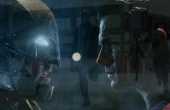Ian Boucher
With a background in film and TV, Ian Boucher became a librarian to advocate for information literacy. He is fascinated by the roles of film and comics in cultural discourse.
Junior Contributor II
- Lurker
- Sharp-Eyed Citizen
- ?
- Articles
1 - Featured
0 - Comments
10
- Ext. Comments
5 - Processed
2 - Revisions
2
- Topics
1 - Topics Taken
1 - Notes
6
- Topics Proc.
4 - Topics Rev.
0
- Points
172 - Rank
X - Score
93
Latest Articles
Latest Topics
Which is Better for Hollywood: Franchises Built Around Nostalgia, or Franchises Built Around Creative Stories?If the successes of films like Jurassic World and Star Wars: The Force Awakens have proven anything, it's that nostalgia is very appealing to movie fans. The Force Awakens is actually the exact opposite of the prequels — where the prequels had a creative story (with a goal) and largely poor acting, Force Awakens has a largely derivative story (with no ending in sight beyond Episode IX) and good acting. The upcoming Ninja Turtles sequel is receiving anticipation from fans who have accepted the lack of story in the new bunch of films and just want to see Rocksteady and Bebop on the screen. Guardians of the Galaxy also relies heavily on nostalgia, albeit that of society rather than cinematic. Regardless of shortcomings, audiences continue to see these movies and these movies continue to get made. So what will ultimately be more financially successful in the long term for the already extremely perilous and risky film industry: appealing ever more to certain fanbases' nostalgia (until that fanbase ages out and a new fanbase comes in), or appealing to everyone's imagination through more originality and creativity?
|
Latest Comments
| DC v Marvel War: What is it Good For? | |
It will happen one day! | DC v Marvel War: What is it Good For? |
I also really like your core point about directing the need for competition. | DC v Marvel War: What is it Good For? |
Great point on the movies, but although having another interest like sports certainly diversifies someone’s leisure time and one can get just as much enjoyment out of the teams on both sides, in the case of sports it’s also very corporate. And following the film industry is a legitimate interest as well; the problem is when it significantly takes over the movies themselves. | DC v Marvel War: What is it Good For? |
All of these comments reinforce to me how much warmth, support, and harmony there really is among superhero movie fans! It’s so great to see it brought out. | DC v Marvel War: What is it Good For? |
Very interesting piece. “Tate’s Lear, came out at a time when the British people needed to be reminded of their identity during the Age of Enlightenment, as every generation has to do from time to time.” With Jurassic World, my concern is an overabundance of spectacle, a repetition of themes for a new generation. Jurassic World does play to both new audiences, but is also part of something that has become a classic that can be immediately accessed, and, additionally, plays to the nostalgia of older audiences. But it seems to think poorly of its audiences, from its conception of DNA to using elements that speak to earlier times, such as Bryce Dallas Howard’s character. The franchise also seems afraid of Crichton, as the film version of The Lost World completely removed Crichton’s theme of the role of behavior in extinction (despite Crichton being a master of spectacle pushing its limits with its themes). And the Jurassic Park brand’s promotional materials attempt to reinforce its authority beyond spectacle, even affecting how museums try to get the attention of children (but also, ironically, inspires children). So when Jurassic World doesn’t utilize more of the possibilities that its premise offers, when it thinks its own spectacle can only go so far with people, what kind of a reminder is it for culture? | Placing Jurassic World in the Evolution of Mainstream Entertainment |
What a reappropriation it would be to have makeup more overtly articulated as being used for artistic expression! And it really does lend itself to being so, in so many ways! | The Feminist Makeup Culture: Reconsidering Cosmetics |
There’s absolutely no reason to not start developing Ms. Marvel as a film or TV character. | Kamala Khan: The new Ms. Marvel |

Thank you!